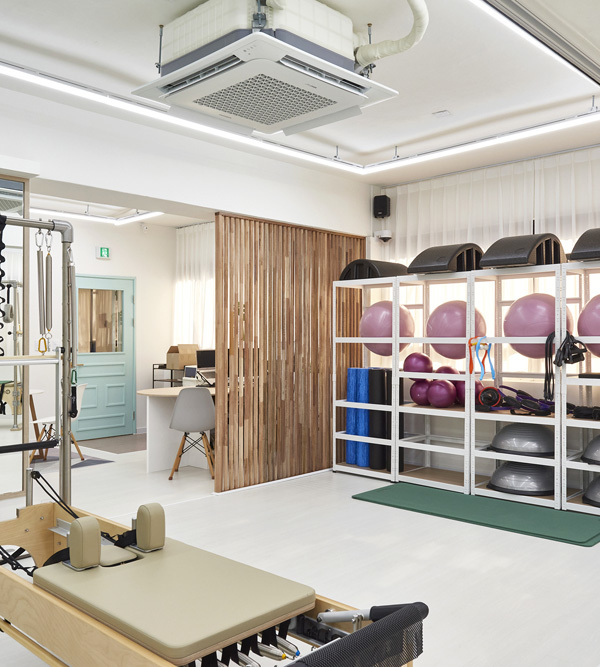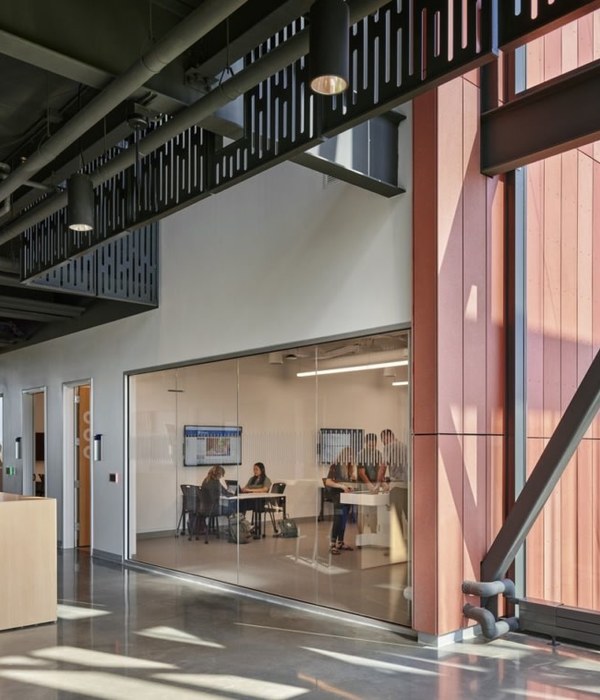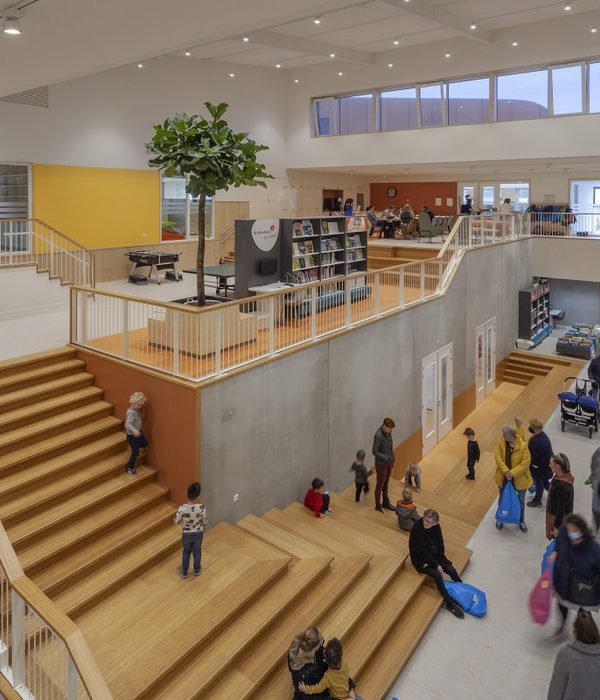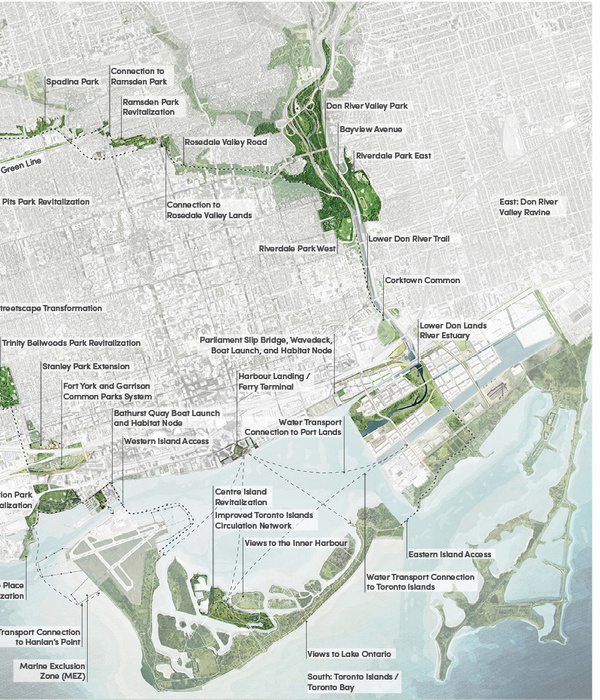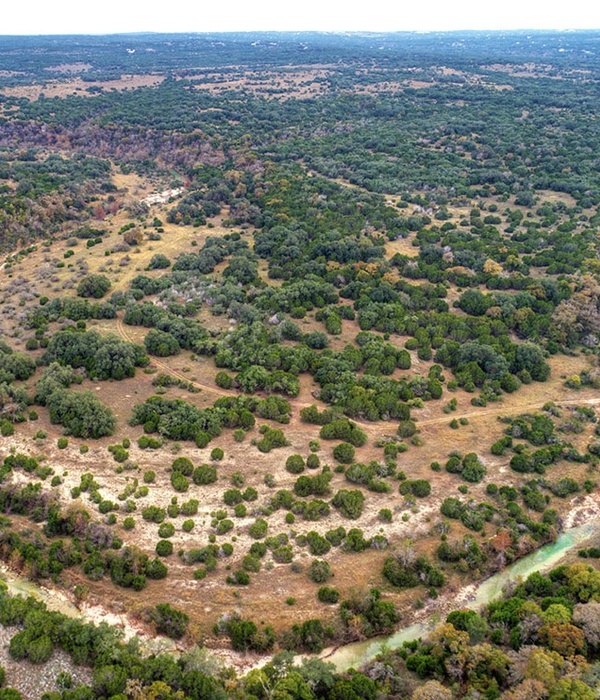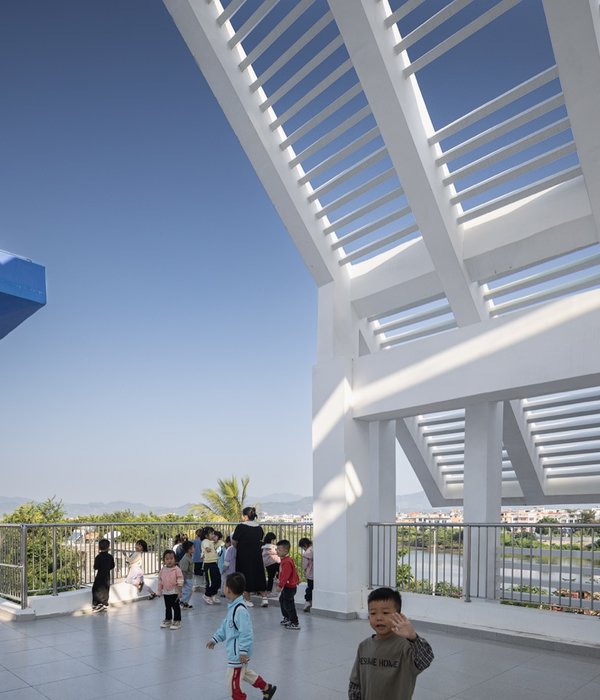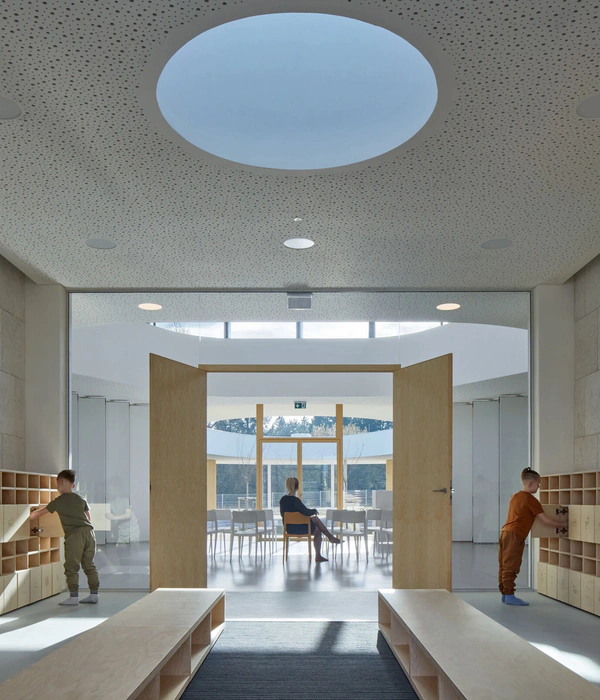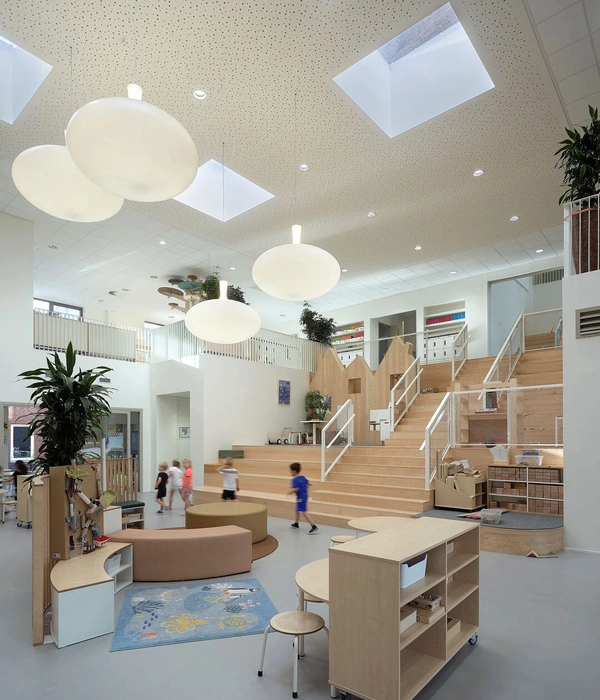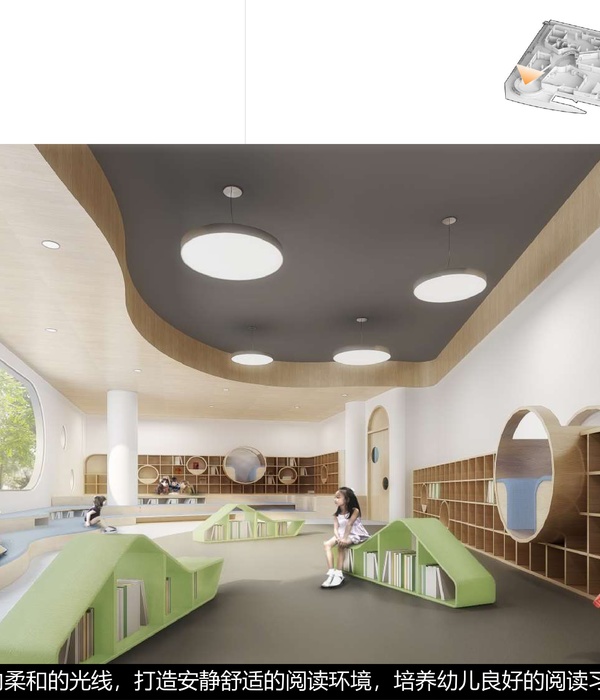以教学模式为出发点 Pedagogical model as a starting point
在“未来学校”中,教育活动将越来越多地在传统课堂之外展开,并在教学期间引入新的学习方式。Saunalahti综合学校是一座为支持前瞻性学校的教学理念而量身定制的建筑。在办学中,学校特别强调新的学习方式、艺术和体育教育以及学生之间的合作精神。本项目将通过创造各种尺度与氛围的互动场所来支持这种全新的教学理念。
In the “Future School” educational activities will increasingly take place outside the traditional classroom and introduce new ways of learning. Saunalahti school is a building tailored to support the pedagogical ideas of a forward-looking school. In its operation, the school puts special emphasis on new ways of learning, art and physical education and collaboration. The building supports these ideas by creating places for interaction of various scales and atmospheres.
▼建筑外观,external view of the building © Andreas Meichsner
“边做边学”|“Learning by doing”
通过自己的双手进行实践,并在实践中获取知识,将大大提升学生们的学习效果。艺术和体育方面的教育对良好的学习和成长有多方面的贡献。在Saunalahti学校,这些教学空间在建筑中占据了主要位置。工坊式活动空间将通过大面积的玻璃墙向街道和校园开放。
Learning and doing with ones own hands improves learning results. Art and physical education versatilely contribute to good learning and growth. In Saunalahti school these teaching spaces have been dedicated a prime location in the building. The workshops open through glass walls to the street and the school yard.
▼大面积的玻璃将室内空间向外部环境开放,large areas of glass open the interior space to the outside environment © Andreas Meichsner
▼檐下的活动空间,space under eaves © Andreas Meichsner
“走出教室”|“Out of the classroom”
Saunalahti学校的空间组织旨在支持于课堂外展开的学习活动,,并鼓励孩子们以开放和创造性的方式使用学校空间。每一处室内和室外空间都是一个潜在的学习场所。
The spatial organization of Saunalahti school supports learning also outside of the classrooms and encourages kids to use the school spaces in open-minded and creative ways. Every interior and exterior space is a potential place for learning.
▼室内外空间关系,relationship between exterior and interior © Andreas Meichsner
▼平和的室内氛围,peaceful interior atmosphere © Andreas Meichsner
▼走廊,corridor © Andreas Meichsner
▼面向户外空间开放,interior open to the outdoor environment © Andreas Meichsner
“互动与协作”|“Interaction and collaboration”
除了一至九年级外,Saunalahti综合学校还设有日托中心、学前班、能够提供休闲活动的青年之家、以及一座集公共图书馆和学校图书馆功能于一体的小型图书馆。在晚上和周末,由不同机构组织的俱乐部和活动,将会把不同的用户群体和所有年龄段的人们聚集在一起。此外,学校的体操场地也对外开放,旨在鼓励当地居民积极使用运动场和学校操场。可以说,该建筑拥有多功能的服务阵列,进而成为了当地家庭的聚会目的地。
In addition to classes 1 to 9 of the comprehensive school, Saunalahti school houses a day care centre, preschool, youth house offering leisure activities and a small library combining the functions of communal and school library. In evenings and weekends there are many operators organizing clubs and activities bringing together different user groups and people of all ages. The gymnastics premises are in communal use and the local residents actively use the sport fields and playground of the school yards. The building with its versatile array of services becomes the meeting point for the families in the area.
▼公共图书馆,the small library © Andreas Meichsner
为整个社区的公共建筑 Common building for the whole community
Saunalahti学校是一座多功能的教育和文化建筑。学校与Saunalahti新住宅区的未来中心广场紧密相连,高度的开放性使其成为居民日常生活环境的积极组成部分。建筑于场地的位置与朝向,旨在为学校庭院尽可能地创造出安全性与舒适性。建筑的西侧与街道相接,而位于南侧和东侧的主要空间则通过学校庭院与广场和未来的住宅区开放连接。建筑形成了学校庭院的屏障,保护户外活动空间免受交通和街道噪音的影响。主要入口位于街道和庭院一侧,此外,庭院内还设有通往住宅区域的出入口。
Saunalahti school is a multi-purpose building for education and culture. The school is closely linked to the future central square of the new residential area of Saunalahti and its open character makes it an active part of the everyday environment of the residents. The building is set on the site in a way that makes the school yards as safe and as comfortable as possible. On the west side the building borders the street while on the southern and eastern sides the main spaces openly connect to the square and the future residential area through the school yards. The building forms a sheltering background to the school yards, protecting them from the traffic and noise of the street. Main entrances are from both the street and the yard side. The home areas have their own entrances from the yard.
▼建筑成为户外活动空间的保护屏障,the building becomes a protective barrier for outdoor activity spaces © Andreas Meichsner
学校庭院被建筑划分为多处适合不同年龄段儿童的区域。年龄最小的孩子们,在学校度过的时间较短,舒适的小院子为孩子们提供了早晨与中午的阳光。院子里较大的儿童区与广场联系更加紧密,直到下午晚些时候,还能从较低的工坊翼继续接收阳光。两个运动场和分散在校园周围的锻炼和游乐设施不仅能够在上学期间为学生们提供服务,同时也在晚上和周末向当地居民开放。
The school yards are divided by the building into areas with favourable conditions for children of different ages. The youngest children with shorter school days enjoy sunlight in the morning and midday hours on their cosy yard. The older kids part of the yard is more closely connected to the square and continues receiving sunlight over the lower workshop wing until late in the afternoon. The two sports fields and the equipment for exercise and play scattered around the school yards are used not only during the school days but also by the locals on evenings and weekends.
▼主入口夜景,night view of the main entrance © Andreas Meichsner
设计充分利用了场地的自然地形,以环绕餐厅的梯田形成了一处室外剧院。这处剧院将室内空间与外部世界整合成统一的空间整体。剧院舞台坐落于学校院子的交汇处,无论是高年级还是低年级的学生们都可以自由使用。
The topography of the site has been utilized in the terraced yard which winds around the front of the dining hall forming an outdoor theatre. The theatre integrates the interior and exterior worlds into a single spatial whole. The theatre stage is situated at the joint between the school yards for the older and younger children.
▼餐厅与露台剧场夜景,night view of the dining hall and the outdoor amphitheatre © Andreas Meichsner
建筑功能 Functionality of the building
功能和空间的组织采用了城市规划的原理,由公共、半公共和私人区域组成,旨在满足不同学龄段的儿童们的活动与成长需求。多功能餐厅作为学校内公共性最强的空间,将不同使用者群体汇集到一起,并构成了建筑的核心。餐厅也作为学校的节日大厅,与剧院舞台直接相连。礼堂和小型图书馆结合了公共和学校图书馆的功能,位于中庭和主入口旁边。通透的餐厅中庭空间及环绕中庭的楼梯和室内阳台提供了望向室外礼堂和Saunalahti地区中心广场的广阔景观视野,让人不禁联想到耸立在高山上的希腊剧院。建筑的空间组织与充满活力的户外庭院鼓励孩子们在休息时间走出室内、到户外空间中玩耍畅游。
The functions and spaces are organized like a city into public, semi-public and private areas depending on the activity and the age of the children. The most public space and the space where all different user groups meet is the multi-purpose dining hall – the heart of the building. The stage opens to the dining hall which also serves as the festival hall of the school. The auditorium and the small library combining the functions of communal and school library are situated next to the heart space and the main entrance. The heart space and its stairs and balconies provide views over the outdoor auditorium and beyond to the central square of Saunalahti area, somewhat like a Greek theatre set into the mountainous landscape. The spatial organization of the building and the stimulating school yard encourage children to go outside during the breaks to play and move around.
▼多功能餐厅,the dining hall © Andreas Meichsner
▼餐厅也作为校园的节日大厅,the dining hall serves as the festival hall of the school © Andreas Meichsner
▼由二层看通高空间,viewing the vast space from upper floor © Andreas Meichsner
▼大面积的玻璃幕墙,large area of the glazing walls © Andreas Meichsner
▼浅色砖材饰面与木材营造出温暖柔和的氛围,light brick finishes and wood create a warm and soft atmosphere © Andreas Meichsner
▼位于餐厅大厅中的舞台,stage in the dining hall © Andreas Meichsner
▼二层公共休闲空间,public leisure area on the upper floor © Andreas Meichsner
较小的孩子们的教室以家庭空间的形式组织,设有可以看到学校庭院的独立小型大厅。大厅可以作为小组学习的场所,与教室和核心空间紧密相连。位于底层的日托中心,坐落于场地最安静的角落,设有独立的院子。年龄较大的孩子们的教室与行政办公室则被规划在二楼,围绕着中庭空间组织。
Classrooms for the smaller children are organized into home areas with their own separate small scale lobbies with views to the school yards. The lobbies are used for group work and are closely connected both to the classrooms and to the heart space. The day care centre on the ground floor has its own yard on the quietest corner of the site. The older children’s classrooms and the administration are placed to the second floor around the heart space.
▼低年级学生教室,classroom for the smaller children © Andreas Meichsner
▼面向学校庭院的独立小型大厅,small independent hall facing the school courtyard © Andreas Meichsner
▼走廊,corridor © Andreas Meichsner
艺术和体育空间落座于街道和学校庭院之间的工坊区域内,包括烹饪、音乐、木材、金属和纺织手工艺品工作室。面向街道的大面积开窗与通往校园的学生画廊,将校园内丰富的活动内容展示给外部世界。青年之家位于建筑的最南端,毗邻工坊车间和未来的中心广场,为休闲活动提供了独特的氛围。一楼的体操大厅可以通过北侧的入口与建筑的其他部分分开使用。
The spaces for art and physical education comprise the workshop area between the street and the school yards. The spaces including workshops for cooking, music, wood, metal and textile handicrafts reveal the action to the surroundings through large openings to the street and the student work gallery toward the school yard. The youth house is placed to the southernmost part of the building next to the workshops and the future central square, providing it with a distinct atmosphere suitable for the leisure activities. The gymnastics halls on the ground floor can be used separately from the rest of the building through the entrances on the northern side.
▼工坊,workshops © Andreas Meichsner
▼工坊室内立面,interior view of the workshop © Andreas Meichsner
▼体育空间,sports hall © Andreas Meichsner
立面与材料 Façades and materials
建筑的空间尺度根据不同年龄段儿童在室内外空间中需求而变化。自由的校舍形态遵循了场地的自然地形。波浪形的屋顶为学校庭院提供最佳的阳光条件,形成柔和的蜿蜒景观。从中心广场和邻近的公寓楼来看,起伏的铜制屋顶形成了建筑的第五立面。建筑立面利用砖的多种特性,包含了不同砌砖和粘合技术的拼贴。不同类型砖材的结合创造出立面肌理的分层,进而带为大型建筑创造出亲人的尺度,并强调出起伏屋檐曲线。同时,面向校园庭院的木制立面则被隐蔽在出挑的屋檐下,为人们提供了避雨的户外空间。
The scale of the building varies according to the functions and the age of the children both in the façades and inside the building. The free-from shape of the new school building follows the terrain. The roof, undulating to provide the optimal sun light conditions for the school yards, takes the shape of a soft meandering landscape. From the central square and the neighbouring apartment buildings the copper roof forms the fifth façade of the building. The brick façades utilize the versatile properties of brick, comprising a collage of different brick-laying and bonding techniques. The layered belts of different brick bondings create an intermediate scale to the façade of the large building and emphasize the undulating eave line of the walls. The wooden façades facing the school yards are sheltered by long eaves.
▼建筑立面,facade © Andreas Meichsner
▼砖材立面细部,details of the brick wall © Andreas Meichsner
建筑中充满自然光线、宽敞通透的中庭空间设有形式自由的天花板,进而与屋顶形式相呼应。浇筑混凝土墙支撑着夹层木梁,玻璃幕墙外侧,木梁暴露在户外空间中清晰可见。本项目采用了高效的节能策略,包括:热回收通风系统、高度控制的照明系统,以及太阳板等。建筑立面与室内空间都采用了坚固耐用的材料,这些材料为建筑营造出温暖和轻松的氛围,立面中采用了粗糙的红砖、天然木材、混凝土,屋顶采用了铜制材料,室内则采用了橡木、混凝土,以及粗糙的浅色饰面砖。
The vast light central heart space of the building is emphasized by the characteristic free-form ceiling that echoes the form of the roof. Massive walls of cast on site concrete support the laminated timber beams that are left visible on the eaves outside the large glass wall of the space. Energy-efficient solutions – such as efficient heat recovery ventilation, highly controlled lighting and solar power – are used in the building. Authentic materials used both on the façades and in the interiors are durable and give the building a warm and relaxed atmosphere – rough red brick, warm wood, concrete and copper on the façades and oak, concrete and light coloured rough surfaced brick in the interiors.
▼室内采用了橡木、混凝土,以及粗糙的浅色饰面砖,oak, concrete and light coloured rough surfaced brick in the interiors © Andreas Meichsner
微妙的室内配色方案与材料的真实质感,赋予了空间温暖和平的氛围,营造出专注的学习环境。此外,设计中还采用了少量的鲜亮色彩,例如在楼梯间与建筑内不同的交通空间中,独特的色彩传递出独特的导向性信号。家具的色彩与区域的标志则与建筑的颜色相呼应,以增强人们在此类大型建筑中的方向感。
Subtle colours are used in the interiors in combination with the real colours of the surface materials to give the spaces warm and peaceful atmosphere suitable for learning. Brighter colours are used sparingly. The staircases and other spaces for circulation of different parts of the building have their unique signal colours. The colour scape of the furniture and signs of these areas echo the colours of the to help orientation in the large building.
▼色彩鲜艳的楼梯间,colourful stairwell © Andreas Meichsner
▼总平面图,site plan © Verstas Architects
▼底层平面图,ground floor plan © Verstas Architects
▼二层平面图,upper floor plan © Verstas Architects
▼立面图,elevations © Verstas Architects
▼剖面图,section © Verstas Architects
Saunalahti school Location: Brinkinmäentie 1, Espoo, Finland Status: Completed in 8/2012 Gross floor area: 10500m2 Volume: 54900 m3 Client: City of Espoo Main contractor: YIT Rakennus Oy Architectural design: Verstas Architects Open architecture competition 2007, 1st prize Principals: Väinö Nikkilä, Jussi Palva, Riina Palva, Ilkka Salminen Project architects: Jari Saajo, Ville Nurkka, Aapo Airas Interior design: Karola Sahi in collaboration with Verstas Architects Landscape architecture: Milla Hakari, Pia Kuusiniemi / LOCI maisema-arkkitehdit Oy in collaboration with Verstas Architects Other team members at Verstas Architects: Antti Carlson, Ossi Konttinen, Charlotte Nyholm, Sampsa Palva, Esmeralda Ståhlberg Photographs by Andreas Meichsner and Tuomas Uusheimo The photographers must be credited when using the photographs.
{{item.text_origin}}

